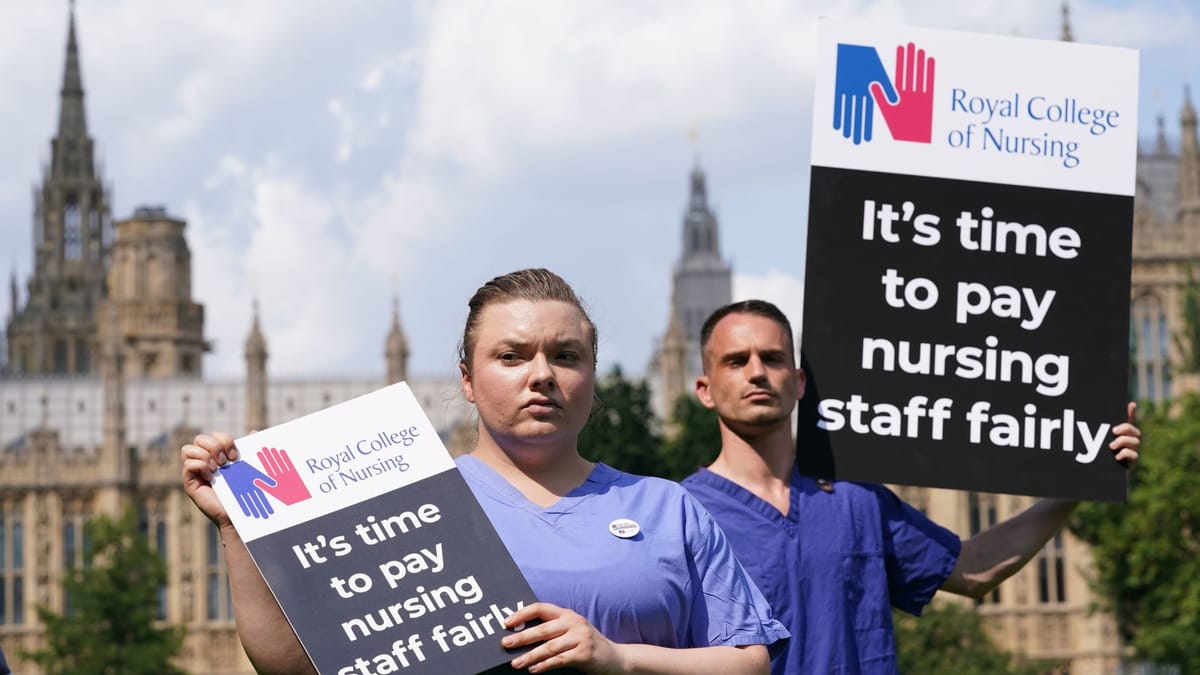Is Britain heading towards a General Strike?

By Archie Thomas, BA Politics and International Relations
2022 has been a year of strikes. Mass industrial action has hit rail, mail, and higher education. With these disputes largely unresolved, strikes have now also been called for by nurses, bus drivers, civil servants, and delivery workers. Is Britain heading for a general strike?
The general council of the Trades Union Congress (TUC) is the body that can call a general strike in the UK. At the moment, most talk among union leaders is about ‘coordinated action’. This seems to be a euphemism used in order not to preempt a decision.
When asked about a general strike, the secretary general of the National Union of Rail, Maritime and Transport Workers (RMT), Mick Lynch, said, ‘I would support a general strike and coordinated action.’ Sharon Graham, general secretary of Unite said, ‘If there are a number of strikes happening at the same time, people can call it what they like, quite frankly.’ In addition, at the TUC’s annual conference, delegates passed a motion calling on the TUC to, ‘provide resources for a special working group of willing unions which would organise coordinated action over pay and terms and conditions where possible with all TUC unions, including further demonstrations, national and regional rallies, and coordinated industrial action where possible.’ With this, it seems union leaders are prepared for a general strike should negotiations across sectors not improve.
The simplest explanation as to why so many workers are going on strike is the fact that inflation in the UK is at 11%, though some measures, which include the price of housing, have it nearer 17%. Meaning anyone not getting a pay rise to match is getting poorer. Additionally, real terms wages have only declined since 2008. This is the reason many unions are calling for above-inflation pay rises, saying workers are long overdue a fair pay rise. Other reasons behind the widespread industrial action include unions’ opposition to the privatisation of public services, the casualisation of work conditions, and changes to pensions.
Looking at the striking sectors in more detail, the rail dispute has been the most prominent and is to continue through the winter. RMT members are striking against cuts to jobs and for a pay increase, as well as proposed changes to the railway pension scheme. Which would make workers less well off in their retirement, even after working for longer. The RMT are demanding a 7% pay rise, no job cuts, and protection of conditions. There are also similar rail strikes called by ASLEF (Associated Society of Locomotive Engineers and Firemen) over the pay of train drivers. Rail strikes are scheduled for 11-12 December, 13-14 December, 3-4 January, and 6-7 January. Between 18 December and 2 January, RMT members will also refuse overtime.
Bus drivers in London will go on strike this winter. Unite members are in dispute over pay with bus operators Abellio and Metroline. Abellio strikes affecting south and west London will take place on 25-26 November, 1-3 December, 9-10 December, and 16-17 December. Metroline strikes affecting north, and west London are scheduled for 1-3 December, 8-9 December, and 15-16 December.
Nurses across the UK are to go on strike for the first time after the government failed to commit to formal pay negotiations. Members of the Royal College of Nursing are demanding an above-inflation pay rise, as well as improved working conditions. In response, Prime Minister Rishi Sunak dismissed nurses’ concerns saying, ‘the unions are asking for a 17% pay rise […] clearly that’s not affordable.’ Instead, Sunak called on the Labour party to tell their ‘union paymasters’ to call off the strikes. Nurses will walk out on the 15 and 20 December. Junior doctors, represented by BMA (British Medical Association), are being balloted to strike. The union claim that they have had a 26.1% pay cut in real terms since 2008 and have received ‘only valueless claps’. Five other unions are balloting for industrial action for NHS staff.
Strikes have also been called in schools and universities, among civil servants, food delivery workers, Amazon warehouse workers, and workers at brewers Greene King.
The last general strike in the UK was almost a hundred years ago, in May 1926. Back then, strikebreakers were called in, and the unions lost after nine days under the pressure of swift government action to maintain essential services.
“The cost of living crisis is hitting all and the public are sympathetic to those fighting to maintain a decent living.”
While unions in Britain face among the strictest trade union restrictions in Europe, unions do have significant public support. Polls show around 60% support the current strikes, with less than a third opposing them. The cost of living crisis is hitting all, and the public is sympathetic to those fighting to maintain a decent living. Currently, politicians seem unwilling to settle disputes. Widespread industrial action will continue to grow, and a general strike is increasingly likely.
Photo Caption: Nurses go on Strike for the first time (Credit: PA).



